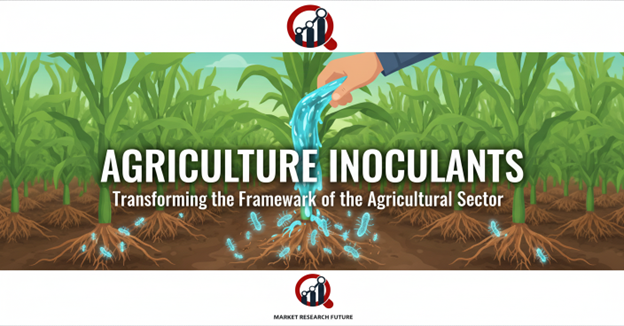Changing The Framework Of The Agricultural Sector With The Introduction Of Agriculture Inoculants
Agriculture Inoculants – Transforming the Framework of the Agricultural Sector

Overview
Agriculture has always been a cornerstone of global economic development—driving income generation, employment, and food security. However, conventional farming practices relying heavily on chemical fertilizers and pesticides have led to soil degradation, reduced biodiversity, and health risks for consumers.
To address these challenges, agriculture inoculants—also known as microbial or soil inoculants—are emerging as a sustainable alternative. These beneficial microorganisms enhance plant health, improve nutrient uptake, and reduce dependency on harmful chemicals, fostering a shift toward organic and eco-friendly farming.
According to market estimates, the global agricultural inoculants market is projected to grow exponentially by 2030, driven by the rising demand for organic food, environmental sustainability, and government initiatives promoting eco-conscious agriculture.
What are Agriculture Inoculants?
Agriculture inoculants are preparations containing beneficial microorganisms—such as bacteria, fungi, or algae—applied to seeds, soil, or plant surfaces to promote growth and disease resistance. These microbes establish symbiotic relationships with plants, enhancing nutrient absorption (notably nitrogen and phosphorus) and improving soil fertility.
Unlike synthetic fertilizers or pesticides, inoculants are biodegradable, non-toxic, and environmentally safe, aligning with the growing global preference for organic farming practices.
Key Benefits of Agricultural Inoculants
- Sustainable Fertility Management – Inoculants enhance nitrogen fixation and phosphate solubilization naturally.
- Eco-friendly Pest and Disease Control – Replace harmful pesticides with biological protection.
- Improved Soil Health – Support microbial diversity and long-term soil productivity.
- Enhanced Crop Quality – Promote nutrient-rich produce with superior taste, aroma, and shelf life.
- Reduced Environmental Impact – Minimize chemical runoff and pollution.
Implementation and Working Mechanism
The efficacy of inoculants depends on correct timing, application method, and crop selection:
- Seed-Stage Introduction
Inoculants are best applied during the seed generation or planting stage, ensuring early establishment of beneficial microbes and improved root colonization. - Root-Zone Application
Beneficial bacteria introduced at the root level enhance nutrient uptake, root stability, and enzyme production, resulting in robust plant growth. - Nutrient Optimization
Microbes facilitate the conversion of atmospheric nitrogen into plant-usable forms and solubilize phosphates, reducing the need for synthetic fertilizers.
This technology has proven effective across both traditional soil-based farming and modern hydroponic systems, ensuring adaptability across farming models.
Market Growth Drivers
The agricultural inoculants market is witnessing strong momentum, propelled by several factors:
- Rising Demand for Organic Food – Consumers increasingly prefer chemical-free, health-oriented produce.
- Government Initiatives – Policies supporting sustainable agriculture and microbial fertilizers.
- Environmental Concerns – Awareness regarding the negative impact of synthetic agrochemicals.
- Technological Advancements – Ongoing research in plant growth-promoting microorganisms (PGPM) is driving innovation.
- Improved Farmer Awareness – Gradual acceptance of beneficial microbes as safe and effective alternatives.
Challenges
Despite promising growth, the market faces barriers such as:
- Limited Awareness – Many growers still associate bacteria with plant diseases.
- Knowledge Gap – Insufficient training on inoculant usage and timing.
- Infrastructure Constraints – In developing regions, lack of access to high-quality products and storage solutions.
Addressing these through education programs, research partnerships, and government support will be crucial for widespread adoption.
Regional Insights
North America and Europe represent the leading markets for agricultural inoculants, driven by strong organic farming cultures, robust regulatory support, and continuous technological innovation. Countries such as the United States, Canada, Germany, and France are at the forefront of microbial input adoption, integrating sustainable practices into modern agriculture. The Asia-Pacific region is expected to witness the fastest growth, led by India, China, and Japan, where increasing awareness, vast agricultural bases, and supportive government programs are accelerating adoption. In Latin America, nations like Brazil and Argentina are showing significant momentum, fuelled by the expansion of organic farming and sustainable agriculture initiatives. Meanwhile, the Middle East and Africa are gradually embracing agricultural inoculants, with adoption driven by growing food demand and concerted efforts to improve soil productivity in the face of challenging climatic conditions.
Future Outlook
The future of agriculture lies in sustainable intensification, where productivity meets environmental responsibility. Agricultural inoculants are set to become integral components of this transformation, supporting eco-friendly crop management and organic production systems.
With continuous technological innovation, rising consumer awareness, and policy support, the global market is poised for robust expansion in the coming decade.
Conclusion
Agricultural inoculants represent a game-changing solution for modern agriculture—merging science, sustainability, and productivity. By replacing harmful chemicals with nature-based microbial solutions, they offer a viable path toward healthier crops, improved soil health, and safer food.
As global demand for organic and sustainable farming accelerates, agricultural inoculants are positioned to become a cornerstone of future agronomy, driving the world toward a more resilient and eco-conscious food system.

Leave a Comment